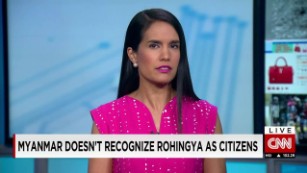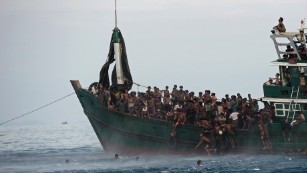Indonesia, Malaysia agree to take in migrant ships, report says
The fate of thousands of migrants believed to be stranded in the Andaman Sea may have taken a step toward resolution with the conclusion of talks between Indonesia, Malaysia and Thailand.At least two of the countries -- Indonesia and Malaysia -- have agreed to offer the migrants shelter provided they are resettled within one year, Malaysian state news agency Bernama reports.
In recent weeks, hundreds of migrants crammed onto ships have been arriving in the waters of both countries. They're believed to be Rohingya fleeing persecution in Myanmar, which is also known as Burma, and economic migrants from Bangladesh.
The agreement was announced Wednesday in a joint statement released shortly after initial talks concluded.Indonesian Vice President Jusuf Kalla said the situation was challenging because the three countries had different considerations and as a result, talks may need to be extended, Bernama said.
'Important step'
The U.N. High Commission on Human Rights (UNHCR) "welcomed" the decision, saying in a statement that it is "an important initial step in the search for solutions to this issue, and vital for the purpose of saving lives."
It said it agreed more work needed to be done to address root causes."It will need to take into account looking properly at the needs of those in need of international protection.
"UNHCR itself is ready to work with countries in the region to find solutions to the plight of these people. These ultimately may include returning people to their home countries voluntarily and once conditions allow."

The meeting took place Wednesday in Kuala Lumpur, the capital of Malaysia. Despite its pivotal role in the crisis, the Myanmar government did not send a representative to the talks, and will not participate in an ASEAN meeting in Bangkok June 29, where the issue will be high on the agenda.
Myanmar does not recognize the Rohingya people and has refused to engage in talks where the term is used.Rohingya Muslims are a long-oppressed linguistic and ethnic minority in Myanmar, a majority Buddhist country. Clashes in 2012 in Myanmar's Rakhine state between Buddhists and Rohingya left hundreds dead and more than 140,000 people homeless.
The United Nations estimates more than 100,000 Rohingya have fled Myanmar by sea since ethnic and sectarian violence erupted.
More ships arrive
As the Asian powers met to decide the fate of the so-called "boat people," more ships laden with migrants landed in Aceh, Indonesia.Two boats arrived overnight, one carrying 102 people, which was spotted around 2 or 3 a.m. local time and brought ashore by fishermen. A second boat, carrying roughly 433 migrants, also landed in Aceh, Steven Hamilton, deputy chief of mission in Indonesia for the International Organization for Migration (IOM), told CNN.
The IOM said it is working with local agencies and local organizations to provide assistance, food, housing, and medical care to those who are disembarking. "The process will begin immediately," Hamilton said from Aceh. "The Acehnese people have been fantastic."
Hamilton said the migrants sat on buses for up to six hours as local officials squabbled over where to put them. Eventually, tents were set up "just to get people out of the buses," and they stayed the night under those tents.
"The people keep coming, and the initial interest to help is still there, but they're feeling a little bit overwhelmed with the numbers," Hamilton said.Many more remain at sea. "Approximately 2,300 people are on boats reportedly not far off shore for over 30 days in Myanmar waters," an IOM spokesperson said. "These boats never departed to Thailand due the crackdown (on migrants landing there), but have been unable to land (elsewhere)."
Kalla said the Indonesian government was looking to set up a plan to address the arrivals, and insisted the country was not pushing back boats, but was committed to finding a solution.Kalla said his office would work with rights groups including the UNHCR and IOM in meeting the needs of the arrivals, and to lay out a plan for the next 12 months.
U.S.: Issue lies with Myanmar
Meanwhile, a U.S. State Department official told CNN that while the humanitarian disaster at sea was the most pressing concern, the fundamental issue lies in Myanmar.

Assistant Secretary of State for Democracy, Human Rights and Labor, Tom Malinowski, told CNN's Hala Gorani that the United States had offered assistance and was urging the governments of Thailand, Malaysia and Indonesia to work together to conduct search and rescue missions, and to allow the refugees to land.
"Our first responsibility is to save lives and that is something that has to be done in the coming days and hours. In the longer run, the biggest challenge is to get at the root cause of this crisis, the treatment of the Rohingya population inside Myanmar."
Pressure Myanmar
Charles Santiago, a Malaysian politician and chairman of the ASEAN Parliamentarians for Human Rights, said regional countries, as well as the U.S. and China, must push Myanmar to help the Rohingya.
"ASEAN promotes itself as an organization that promotes rule of law, democracy, a sharing and caring society... this is really a challenge, whereby the most vulnerable community in the region is now seeking help. And this isn't just any kind of help, this is a matter of life and death."
He said that the meetings in Malaysia and Thailand this week and next will be more about short-term solutions to the immediate crisis. In the longer term, he says that the regional governments have a role to play."The long-term solution is for ASEAN to put pressure on the Myanmar government to (implement) political reforms and make sure citizenship (for the Rohingya) is given."
News Courtesy: www.cnn.com











